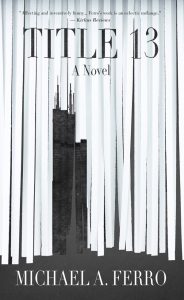PUBLISHED MARCH/APRIL 2018
by Michael A. Ferro, Author,
TITLE 13 --

Michael Ferro
A debut literary fiction author assesses his options and decides to publish with an independent publisher
“The easiest thing to do in this world is getting your novel published,” said no one ever. (OK, well, perhaps John Grisham says it when he’s sharing tapas at a trendy New York City restaurant with James Patterson and Dan Brown. Then again, that’s a pretty mean-spirited assumption, I suppose, since perhaps those authors aren’t even friends or live in New York City or like restaurants where you share small plates of tiny food.) My point is—as any debut author will tell you—finding a publisher and going through the motions is one of the most exhausting and nerve-racking experiences there is in the business of writing.
For some, writing the book itself isn’t the hardest aspect—in fact, that might be the easy part; rather, it’s the daunting task of finding a publisher who can connect with your work and feels the need to share it. Spend some time around book fairs, writing conferences, or trade shows and one thing will become clear, though: Now, more than ever, there are plenty of publishing options, from the Big Five and well-respected indie publishers, as well as boutique presses and self-publishing. So how does one author—finished manuscript in hand—begin their search?
My own adventure in the publishing world will likely sound like many others. I walked into Random House’s Manhattan headquarters, dropped my mammoth tome onto what looked to be an important editor’s desk, and confidently stated: “I shall accept no less than a $1 million advance and will refuse all editorial suggestions!” After being escorted out of the building by Sylvester Stallone in full
Rambo getup, I realized I was dreaming and awoke. (Yes, even in my dreams I am often thrown out of fancy places; sometimes by famous, muscular movie stars.) But the reality of my publishing adventure starts out much less interesting, so I thought I might grab your attention first.
I had spent two years writing and editing my debut literary fiction novel,
TITLE 13. With the final draft completed, I began a long and lonely trek to find a publisher to help bring my work to the world. Unlike many writers I now have the pleasure of knowing, when I started out after finishing my book, I knew no one in the industry. In fact, I barely knew anyone at all. (What friends I had had grown tired of my seclusion and moved on to other important life events, like “getting married” or “having kids,” and even my parents began avoiding my calls. (This is, of course, comedic hyperbole, and my mother would be furious if I did not state it as so.) Much like the neglected nerd at a school dance, I was anxiously puttering about with my manuscript, watching as more and more debut novels were being released. I thought, “How did they do that?”, “Do I need an agent?”, and “Maybe I should comb my hair or buy a suit or something.”
A writer on the outside looking in quickly learns once stepping through the door into the grand publishing arena that no one is likely to get a seat at the big table with the Big Five without an agent. I set those aspirations aside for the time being. Seeing as my novel was not only literary fiction, which already made it a hard sell, but also an eclectic mixture of both satiric humor and an emotionally devastating tale of addiction, I knew I was in for a bumpy ride. What I needed more than anything was some friendly advice from someone who actually knew what they were doing. Enter the independent publishing community!
As a longtime fan of small, independent publishers, I started looking through my bookshelves for my favorite indie titles and researching the publishers. I began approaching them one-by-one and was stunned at how friendly so many of them were. Here I was, just some Midwestern schmuck writing to these kind folk asking them to consider my manuscript, or at the very least, tell me what I was doing wrong, or what I could be doing better. Some of these wonderful people actually went out of their way to assist me.
One of the first people I’d come across who I could shout from the rooftops over was none other than the inexhaustible
Laura Stanfill of Forest Avenue Press in Portland, Oregon. Though Ms. Stanfill very politely informed me that she wasn’t reading any new manuscripts at that time, she proceeded to not only answer all of my ridiculous questions about the industry, but was soon connecting me with writers and publishers in my own city of Ann Arbor. Here was a woman quite literally on the other side of the country connecting the dots for me with literary citizens who were right outside my own front door! I was, and still am, forever in her debt. The amount of time she spent sharing her insights and knowledge with me were priceless, and in an effort to pay my cosmic bill, I will always be ready and willing to help out an author who is just getting their own start.
 TITLE 13
TITLE 13 by Michael A. Ferro
A few months later, I received an email from one of the top independent presses I’d been hoping to hear from: Harvard Square Editions. I’d read a few of their titles and was impressed by the number of awards their authors had won, including a National Book Foundation Award, a Nautilus Book Award, and others. Best of all, they published some very interesting and eclectic titles. Harvard Square Editions’ stated purpose is to publish “environmentally and socially conscious literary fiction.” With
TITLE 13, I wasn’t just hoping to get a book deal, but wished to spark an important conversation with readers about addiction as it relates to a sense of purpose and belonging in a culturally divided America. At the same time, I was hoping to provide a satiric look at the lamentations of civil service workers in the modern age of asinine politics and government. It’s certainly a haughty expectation, but Harvard Square Editions informed me that they felt my novel could do just that. The publisher and I discussed the focus of my novel in detail, and I was very pleased to see that they had read my manuscript so carefully. Not long after that, I officially signed my contract, and the adventure began.
Now, like I’ve said, I can’t tell you what it’s like to have one of the Big Five publish your debut novel, but what I do know about independent publishing is this: When you find an indie that cares about your writing, you’re going to work with their whole team. And, most importantly, at least to me, was the creative control I had throughout the editing and design process. My publisher understood what I was trying to do, knew that I had agonized over every aspect of the story already, and very graciously deferred to my judgement more often than not. After all, when you publish with an independent press, the author is going to be a major part of the marketing process, so wouldn’t an author work most effectively to sell a product that they believe in with all their heart?
I should also mention here that self-publishing was something I never really considered. Don’t get me wrong: I have nothing against those who self-publish. I say more power (and money) to them, but for me, the allure of a press with major distributors, connections to booksellers and libraries, and, of course, a certain level of prestige, were just too enticing. Another reason I wanted to avoid self-publishing was because of the self-promotional aspect inherent within it. If there’s one thing I hate, it’s talking about myself (said the guy writing an article about himself for a magazine). But something I quickly learned over the past few years was that there is a lot of noise out there when it comes to authors and their books. The days of Cormac McCarthy (i.e., writing a book alone in the desert, sending it by burro to your NYC publisher, then washing your hands of it) are over. If I wanted to have my novel find an audience and connect with people, I needed to start making connections and getting the word out that it would soon be on store shelves.
Then something happened that I had not expected.
As I mentioned earlier, when I finished writing my book, I had no writer or publisher friends. But as I began the process of reaching out to authors that I admired for blurbs and folks in the review markets, I began to realize one thing above all else: These people are not only incredibly talented, but wonderfully kind and helpful! More often than not I would connect with a writer I’d revered and begin a wonderful dialogue with them. My spider web of social media connections began to grow, and I started to truly interact with literary people, all sharing ideas and supporting one another.
Before Harvard Square Editions offered me a contract, no one had read my novel—not a writing group, not friends, and not family. I’m not exactly sure as to why this was, other than necessity, since I didn’t really know anyone, and perhaps preference, since I was still dreaming Cormac McCarthy-esque dreams at that time. As I write this now, I am roughly two months away from my “pub day”—that day that all writers dream of when everyone they know (and don’t know) can suddenly access their work. If you’re reading this now, that means the book was published according to schedule on Feb. 1, 2018, and I am likely in some darkened corner of my home with shades drawn, desperately petting my dog with vigor as he looks up to me with pleading eyes that scream, “Please, Mike, I have to go outside to pee and smell stuff!”
TITLE 13 will no longer just be a thought in the back of my head but an actual book available online and at fine bookstores everywhere.
If there’s one nugget of wisdom I wish to share about publishing with an independent publisher, it’s this: The people make the difference. The world of indie presses is filled with some of the most inspiring, thoughtful, caring, and empathic individuals I’ve ever met. They know it’s a struggle, they sympathize with their authors, and do their best to put out the best literature from people not named Stephen King. (No offense to Mr. King, whom I adore and am personally kind of scared of.)
Another nugget of wisdom would be the author involvement in the publishing process. (Hey, two wisdom nuggets for the price of one!) Sure, each press does things their own way, but indies really push for their authors to be an integral element in marketing the book. When the time comes for me to do it all again and find a publisher for my next novel, be it with another indie or one of the Big Five, I can do so with my feet firmly planted in reality, keeping my expectations firmly in check. Well, perhaps for the most part at least.
Michael A. Ferro is an author and writer from Detroit. His work has appeared in numerous online and print journals, many of which can be found at his website michaelaferro.com.
His debut novel, TITLE 13
, is forthcoming from Harvard Square Editions in 2018. He lives in rural Ann Arbor, Michigan.
Learn more about this topic:
Authors